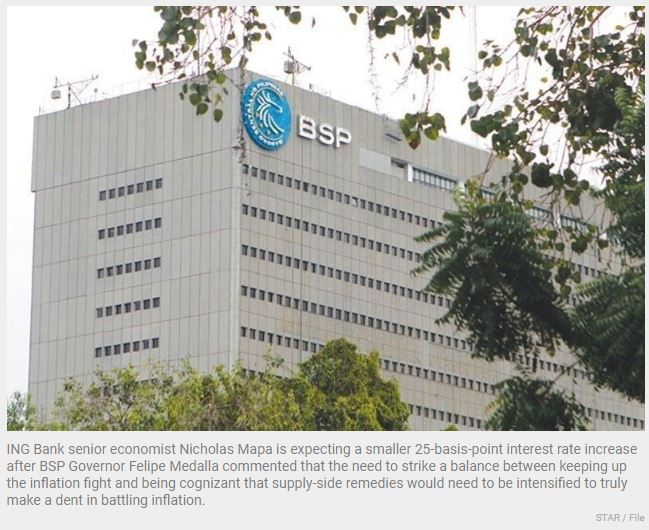Philippines: BSP hints at interest rate hike pause
MANILA, Philippines — The Bangko Sentral ng Pilipinas (BSP) is set to continue its tightening cycle although at a slower pace of 25 basis points on Thursday, with some economists saying this could be the last.
ING Bank senior economist Nicholas Mapa is expecting a smaller 25-basis-point interest rate increase after BSP Governor Felipe Medalla commented that the need to strike a balance between keeping up the inflation fight and being cognizant that supply-side remedies would need to be intensified to truly make a dent in battling inflation.
“The BSP has been doing most of the heavy lifting and the fact that inflation for some items remains high only proves that monetary tightening may not be the apt remedy,” Mapa said.
Headline inflation slightly eased to 8.6 percent in February from 8.7 percent in January, but core inflation accelerated to 7.8 percent from 7.4 percent.
Inflation accelerated to 5.8 percent and exceeded the BSP’s two to four percent target in 2022 from 3.9 percent in 2021.
To tame inflation and stabilize the peso, the BSP has so far raised key policy rates by 400 basis points, which brought the benchmark interest rate to a 16-year high of six percent from an all-time low of two percent.
“This could be the last rate hike for this tightening cycle, especially if the Fed (US Federal Reserve) turns dovish and domestic inflation sustains its moderation,” Mapa said.
Domini Velasquez, chief economist at China Bank, said the hike this week could be the last as the central bank is likely to pause at a terminal rate of 6.25 percent for the rest of the year.
“Inflation remains hot for now, but will likely steadily come down as the year progresses. Core CPI (consumer price index) is still on an uptrend and is expected to peak this March or in April. Our base scenario is that the BSP will pause after the March meeting,” Velasquez said.
The economist pointed out that there are already some downward pressures on inflation, such as lower vegetable prices, a possible cut in transport fares and lower airline charges.
However, she added that upside risks still dominate, such as petitions for wage hike increases and current demand-supply imbalance of certain food items.
“In its following meeting in May, we would have come full cycle already from the start of monetary tightening and expect higher interest rates to already impact economic momentum,” Velasquez said.
For the rest of the year, Velasquez thinks the BSP may likely keep monetary policy tight until it is sure inflation is firmly within the central bank’s two to four percent target.
China Bank sees headline inflation falling to four percent by November.
She said a key downside risk would be if the contagion effect of the bank fallout in the US leads to wealth losses and hence becomes disinflationary.
Financial markets were rocked by the collapse of the Silicon Valley Bank (SVB) and Signature Bank in the US, as well as the crisis faced by Credit Suisse in Europe.
Alvin Arogo, economist at Lucio Tan’s Philippine National Bank, said the BSP is likely to slow down the pace of its tightening cycle with a 25-basis-point hike on Thursday from the 50-basis-point increase last Feb. 16.
“We expect the central bank to dial down the pace of hikes from 50 basis points in February as monetary authorities will likely take into consideration the lagged effect of previous hikes, the unexpected inching down of inflation in February, and the risk of a global financial crisis due to the recent bank failures in the US,” Arogo said.
Security Bank chief economist Robert Dan Roces said the Monetary Board is set to slow its policy rate hike by 25 basis points, driven by concerns over rising inflation, a desire to stabilize the local currency and an effort to attract foreign investments.
“This smaller increase, however, compared to the previous 50 basis points move suggests a more cautious approach to strike a balance between managing inflation – which is estimated to begin tempering this month – and supporting economic growth, attempting to maintain macroeconomic stability while addressing potential risks to the economy given what happened to several small banks in the US and to Credit Suisse,” Roces said.
UnionBank chief economist Ruben Carlo Asuncion also sees a 25-basis-point increase on March 23 as the BSP will prioritize inflation control as part of its mandate.
Source: https://www.philstar.com/business/2023/03/20/2252880/bsp-hints-interest-rate-hike-pause


 Thailand
Thailand




